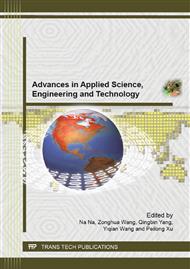p.110
p.117
p.122
p.127
p.131
p.135
p.139
p.143
p.148
Research on Grinding Residual Stresses on the Surface of Nanostructured Ceramic Coatings
Abstract:
Residual stress produced on the surface of nanostructured ceramic coatings when they were grinded by diamond superhard abrasive wheel, these residual stresses affected directly the fracture strength, fatigue strength and corrosion resistance of the ceramic parts, they affected the surface quality of machined ceramic parts, and thus they affected the working reliability and the service life of ceramic parts. The tests show that the distribution of residual stress is directional, the residual compressive stress can make the hardness of the material increase, they can reduce the wear rate of the material, for the tested specimen, grinding surface whole residual stress σ is the sum up original residual stress σ0 (existed in the part’s surface ) and grinding residual stress Δσ (formed by grinding process.), σ=σ0 + Δσ.
Info:
Periodical:
Pages:
131-134
DOI:
Citation:
Online since:
June 2013
Authors:
Price:
Сopyright:
© 2013 Trans Tech Publications Ltd. All Rights Reserved
Share:
Citation:


